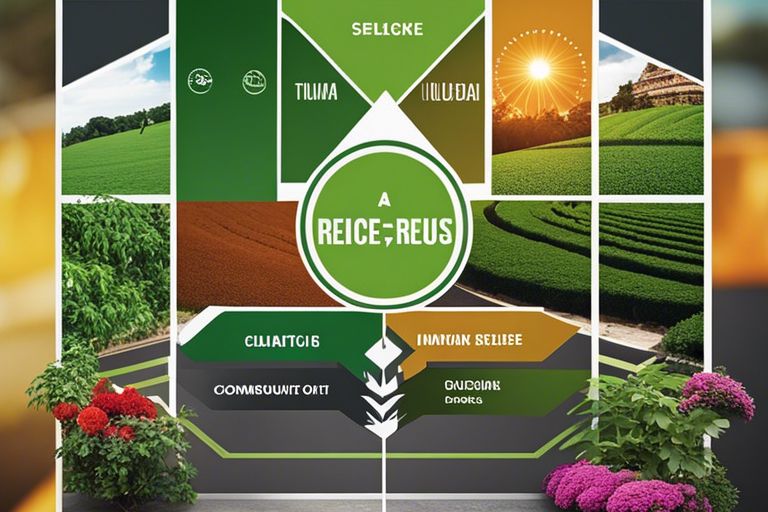India is facing a growing environmental crisis, with waste management posing a significant challenge. Implementing the reduce, reuse, recycle principle in India can have profound positive impacts on the environment, economy, and public health. By reducing the amount of waste produced, reusing materials, and recycling resources, we can significantly decrease pollution, conserve natural resources, and reduce greenhouse gas emissions. To explore deeper into the importance of this principle, explore the article "Does the implementation of the 'reduce, reuse, recycle ...'."
Key Takeaways:
- Environmental Conservation: Implementing the reduce, reuse, recycle principle in India helps in conserving the environment by reducing the amount of waste generated and promoting the efficient use of resources.
- Resource Efficiency: By reusing and recycling materials, India can reduce the pressure on its natural resources and lower the energy consumption required for producing new goods.
- Economic Benefits: Embracing the reduce, reuse, recycle approach can create new job opportunities in the recycling industry, save money on raw materials, and contribute to a more sustainable economy in India.

Environmental Benefits
Conservation of Natural Resources
Little thought is often given to the resources that go into producing everyday items. By implementing the reduce, reuse, recycle principle in India, we can significantly reduce the exploitation of natural resources. Conserving these resources helps in maintaining ecological balance and ensures their availability for future generations.
Reduction in Pollution and Greenhouse Emissions
To combat pollution and reduce greenhouse gas emissions, incorporating the 3R principle is crucial. Environmental degradation is a pressing issue, and recycling helps in reducing the emission of pollutants from landfills and incineration. It also helps in curbing carbon dioxide emissions, thus contributing to combating climate change.
The reduction in pollution not only benefits the environment but also has a direct impact on public health. By minimizing the release of harmful substances into the environment through proper waste management, we can create a cleaner and healthier living environment for all.
Economic Advantages
Cost Savings for Businesses and Households
Businesses can significantly reduce their operating expenses by implementing the reduce, reuse, recycle principle. By finding ways to minimize waste and recycle materials, businesses can lower their disposal costs, decrease the need for raw materials, and improve efficiency. Similarly, households can save money by reusing items, reducing their overall consumption, and recycling materials instead of discarding them.
Growth of the Recycling Industry and Job Creation
Cost The implementation of the reduce, reuse, recycle principle can lead to the growth of the recycling industry in India. As the demand for recycled goods increases, new recycling facilities will emerge, creating job opportunities for many individuals. This growth in the recycling industry can also boost the economy and contribute to sustainable development.
Households play a crucial role in the growth of the recycling industry by segregating waste and opting for recycling options. By actively participating in recycling programs, households can contribute to the environment and create a demand for recycled products. This, in turn, can stimulate the recycling industry and pave the way for job opportunities within the sector.
Social Implications
Promotion of Community Involvement
Promotion of the Reduce, Reuse, Recycle principle in India can significantly enhance community involvement in environmental conservation efforts. Despite the diverse cultural landscape in India, this principle can serve as a common ground for communities to unite towards a shared goal of sustainability. By organizing clean-up drives, waste segregation campaigns, and recycling initiatives, communities can work together to preserve their environment.
Awareness and Educational Opportunities
Community awareness and educational opportunities play a vital role in the successful implementation of the Reduce, Reuse, Recycle principle in India. It is crucial to educate individuals about the environmental impact of their actions and the benefits of sustainable practices. Providing workshops, seminars, and educational resources can empower communities to make informed choices and take proactive steps towards waste reduction and recycling.
Challenges and Solutions
Overcoming Infrastructural Hurdles
Not all regions in India have the necessary infrastructure in place to support effective waste management practices. Lack of proper waste segregation systems, recycling facilities, and landfill management poses a significant challenge to the successful implementation of the reduce, reuse, recycle principle. However, with concerted efforts from both the government and private sector, these infrastructural hurdles can be overcome.
Policy Implementation and Enforcement
Challenges in policy implementation and enforcement are also major obstacles in promoting sustainable waste management practices in India. While there are existing regulations and guidelines in place, their implementation and enforcement at the grassroots level remain a challenge. Lack of awareness, limited resources, and corruption can hinder the effective execution of waste management policies.
Enforcement: To address these challenges, there is a need for stricter enforcement mechanisms and penalties for non-compliance with waste management regulations. Additionally, enhancing public awareness campaigns and providing training to enforcement authorities can help improve compliance rates and ensure a more sustainable waste management system in India.
Final Words
From above, it is evident that implementing the reduce, reuse, recycle principle in India brings about a multitude of benefits. Not only does it help in conserving natural resources and reducing pollution, but it also creates opportunities for green job growth and stimulates the economy. Furthermore, adopting sustainable practices can lead to a cleaner environment and healthier communities for current and future generations. It is imperative that individuals, businesses, and policymakers work together to embrace the principles of reduce, reuse, and recycle to pave the way for a more sustainable and prosperous future in India.
FAQ
Q: Why is it important to implement the reduce, reuse, recycle principle in India?
A: Implementing the reduce, reuse, recycle principle in India is crucial for minimizing waste generation, conserving natural resources, reducing pollution, and promoting sustainable development. By following these principles, India can significantly reduce its environmental impact and create a cleaner, healthier future for generations to come.
Q: What are the benefits of reducing waste in India?
A: Reducing waste in India through practices such as minimizing packaging, avoiding single-use items, and opting for reusable products can help save energy, lower greenhouse gas emissions, and decrease the burden on landfills. This not only conserves resources but also saves money and reduces the environmental footprint of the country.
Q: How does recycling contribute to a greener future in India?
A: Recycling plays a vital role in India's waste management system by diverting materials from landfills and reducing the need for virgin resources. By recycling items like paper, plastics, glass, and metals, India can conserve energy, reduce water usage, and decrease air pollution. Additionally, recycling creates employment opportunities and promotes a circular economy where materials are reused, extending their lifespan and benefitting the environment.




